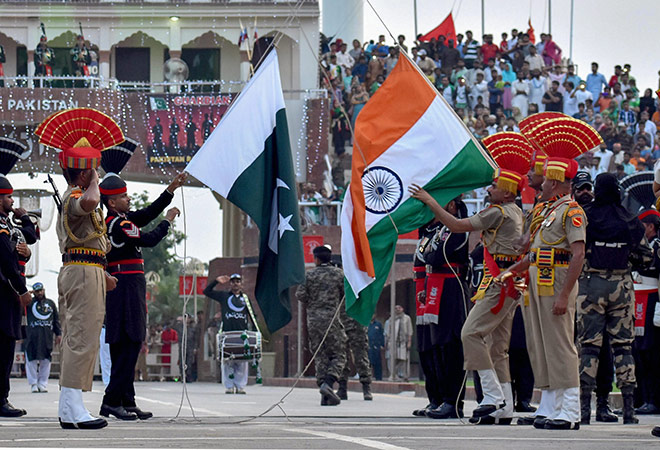
by Dr. Rajkumar Singh 18, 2021
In Pakistan’s view the problem of Jammu and Kashmir was accepted as a “dispute”, it began to consider the same as ‘core issue’. In yester years, whenever, Indian over-cautiousness had taken the form of hedging after agreeing to discuss the problem of Jammu and Kashmir along with other issues which need to be resolved between the two countries, Pakistan had joined the offer of talks to the condition that the core issue of Jammu and Kashmir be settled first of all. On the dispute they failed to present any concrete suggestion officially except the context of outdated UN resolution. Over the years Pakistan has fashioned the terms of reference for discussion on Kashmir in the following concepts: Self – determination, the Muslim identity of the people of Kashmir, violation of human rights, the denial of representative government in Jammu and Kashmir etc. There is no doubt that we had to contradict these Pakistani arguments to establish the validity of our views on the status of Kashmir.
Pakistani perceptions
Pakistan needs to get rid of the imprisoned mindset that far from being “Core” the issue of Jammu and Kashmir is one of many, and certainly not central to Peace talks. There is socio-economic and socio-cultural growth to consider. However, over the years, India has also developed a duality of approach in case of Kashmir. Right from the period 1977 till 1996, on the one hand we have said that the Kashmir issue should be discussed and resolved “bilaterally with Pakistan”, on the other, we connived from discussing the substance of the issue on the basis of the argument that the status of Kashmir as an integral part of India, cannot subject to any negotiations. Instead of adopting this contradictory logic we could have boldly agreed to discuss the Kashmir issue with Pakistan, emphasising that the substance of the dispute is Pakistan questioning the legality and constitutionally valid status of Jammu and Kashmir as an integral part of India . Our refusing to discuss the Kashmir issue specially and in substance has affected the credibility of our stance in the international community of which Pakistan has taken full advantage.
Positive response
With the change of guards in New Delhi and Islamabad the talks between the two revived during 1996-97. It was for the first time since 1972 that New Delhi agreed to have talks with Pakistan on Kashmir. Earlier India pledged its support to the Simla Agreement but did not discuss the future of Kashmir. We made ourselves believe that there was no need to have talks with Pakistan. But Islamabad continued to treat the issue as a dispute between India and Pakistan and always emphasised on the third party mediation/intervention and wished its solution as per the UN resolution. No Indian government can accept the secession of Jammu and Kashmir and no Pakistani government can accept the LoC. At Simla in 1972, the LoC was sought to be imposed in the wake of a military defeat. It failed as such attempts do eventually. It is worse than pointless for a leader to embark on a peace process unless he is clear and realistic about the product he seeks, the concessions that are on offer and the ones he is himself prepared to make. Both must be ready for a compromise and then only move forward.
Three round of Secretary–level talks were held between the two countries, the first followed, when the two Prime Ministers met at Male on 12 May 1997. In the talks, right from the beginning, Pakistan insisted that unless the “core issue of Kashmir” was solved, bilateral relations would never improve. It also implied that the Indian approach of normalising relations in other spheres would only serve to provide a cosmetic touch and would not materially alter the relations. While India continued to insist that it was ready to discuss Kashmir, normalisation of relations in other spheres, especially commercial, economic and people to people would help accelerate the process of normalisation. The new dispensation was, no doubt, hopeful of solving the issue of Kashmir, was cautioned, ‘The Gujral doctrine should not become a mantra. It is a commendable policy and has worked well in Sri Lanka, Bangladesh and Nepal. But in the case of Pakistan it must be applied to the extent that we get the right response from the other side. The doctrine’s success will depend on matching deed for deed’.
Further developments
The second round of Foreign Secretary–level talk was held in Islamabad in June 1997. As a proof of good gesture, New Delhi in haste, to achieve forward movement, agreed to constitute six working groups to discuss as many as problems it had identified. Islamabad’s allegation was that there was no separate group constituted on Kashmir. The Government of Nawaz Sharif would have been satisfied if only a separate group was constituted to resume talks on Kashmir as disclosed by the Pakistani premier in conversation with Kuldip Nayar, a visiting Indian journalist, ‘I do not mind how long time it take provided we begin to discuss Kashmir’. However, discussing Kashmir as a separate subject in a separate working group does not automatically imply that India would compromise in any manner on the status of Kashmir. Pakistan always discussed Kashmir as the first item on the agenda, but moved on to discuss other subjects in a practical manner. The eight point charter of priorities chalked out by the Foreign Secretaries during the talks also included confidence–building measures. In the third round of talks that started in New Delhi, in the middle of September 1997, they did not succeed in breaking their earlier position. The Foreign-Secretary-level talks ended with no forward movement on outstanding bilateral issues, particularly a mechanism for discussing Kashmir due to the apparent lack of desire on Pakistan’s part to show any progress.
